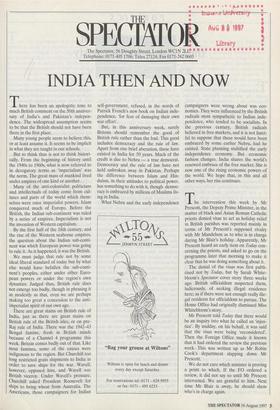SPECIA E T
•
The Spectator, 56 Doughty Street, London WC1N 2LL• • • • • • • • • • • • • * • Telephone: 0171-405 1706; Telex 27124; Fax 0171-242 0603
INDIA THEN AND NOW
There has been an apologetic tone to much British comment on the 50th anniver- sary of India's and Pakistan's indepen- dence. The widespread assumption seems to be that the British should not have been there in the first place.
Many young people seem to believe this, or at least assume it. It seems to be implicit in what they are taught in our schools.
But to think thus is not to think histori- cally. From the beginning of history until the 1940s to 1960s, what is now referred to in derogatory terms as 'imperialism' was the norm. The great mass of mankind lived under empires of one kind or another.
Many of the anti-colonialist politicians and intellectuals of today come from cul- tures and parts of the world which them- selves were once imperialist powers. Islam conquered much of Europe. Before the British, the Indian sub-continent was ruled by a series of empires. Imperialism is not the invention of Western capitalism.
By the first half of the 18th century, and the rise of the Western seaborne empires, the question about the Indian sub-conti- nent was which European power was going to rule it. As it happened, it was the British.
We must judge that rule not by some ideal liberal standard of today but by what else would have befallen the sub-conti- nent's peoples, either under other Euro- pean powers or under the region's own dynasties. Judged thus, British rule does not emerge too badly, though in phrasing it as modestly as that, even we are perhaps making too great a concession to the anti- imperialist spirit of our own age.
There are great stains on British rule of India, just as there are great stains on British rule of the British isles, or on pre- Raj rule of India. There was the 1942-43 Bengal famine, fresh in British minds because of a Channel 4 programme this week. Britain comes badly out of that. Like most famines, some of the causes were indigenous to the region. But Churchill too long restricted grain shipments to India in order to save ships for the war. Wavell, however, opposed him, and Wavell was British viceroy. Under Wavell's pressure, Churchill asked President Roosevelt for ships to bring wheat from Australia. The Americans, those campaigners for Indian self-government, refused, in the words of Patrick French's new book on Indian inde- pendence, 'for fear of damaging their own war effort'.
But, in this anniversary week, surely Britons should remember the good of British rule rather than the bad. This good includes democracy and the rule of law. Apart from one brief aberation, these have existed in India for 50 years. Much of the credit is due to Nehru — a true democrat. Democracy and the rule of law have not held unbroken sway in Pakistan. Perhaps the difference between Islam and Hin- duism, in their attitudes to political power, has something to do with it, though democ- racy is embraced by millions of Muslims liv- ing in India.
What Nehru and the early independence campaigners were wrong about was eco- nomics. They were influenced by the British radicals most sympathetic to Indian inde- pendence, who tended to be socialists. In the previous century, British radicals believed in free markets, and it is not fanci- ful to suppose that these would have been embraced by some earlier Nehru, had he existed. State planning stultified the early independence economy. But economic fashion changes. India shares the world's renewed embrace of the free market. She is now one of the rising economic powers of the world. We hope that, in this and all other ways, her rise continues.
The intervention this week by Mr Prescott, the Deputy Prime Minister, in the matter of black and Asian Roman Catholic priests denied visas to act as holiday relief in British parishes was reported mainly in terms of Mr Prescott's supposed rivalry with Mr Mandelson as to who is in charge during Mr Blair's holiday. Apparently, Mr Prescott heard an early item on Today con- cerning the priests, and asked to go on the programme later that morning to make it clear that he was doing something about it.
The denial of the visas was first publi- cised not by Today, but by Sarah White- bloom's Spectator cover story three weeks ago. British officialdom suspected them, ludicrously, of seeking illegal residence here; as if there were not enough really ille- gal residents for officialdom to pursue. The Home Office had originally dismissed Miss Whitebloom's story.
Mr Prescott told Today that there would be an inquiry into what he called an 'injus- tice'. By midday, on his behalf, it was said that the visas were being 'reconsidered'. Then the Foreign Office made it known that it had ordered the review the previous week. This was written up as Mr Robin Cook's department slapping down Mr Prescott.
We do not care which minister is proving a point to which. If the FO ordered a review, it did not say so until Mr Prescott intervened. We are grateful to him. Next time Mr Blair is away, he should show who's in charge again.


























































 Previous page
Previous page